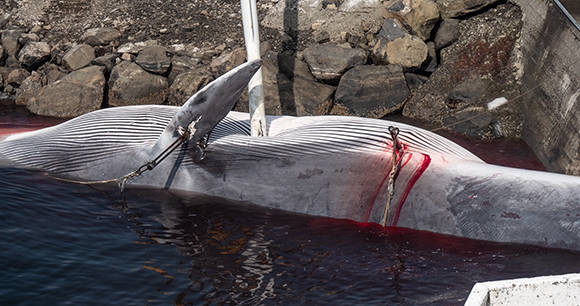
Washington, DC—Iceland will again allow fin whaling, beginning Sept. 1, but with stricter requirements, the country’s minister of food, agriculture and fisheries announced today.
Minister Svandis Svavarsdótti previously announced on June 20 that Iceland would temporarily halt the hunting of fin whales until August 31. That decision came one day after the country’s Expert Advisory Board on Animal Welfare submitted a report concluding that the commercial killing of whales does not comply with Iceland’s Animal Welfare Act.
In her notice issued today, Svavarsdótti stated that whalers would face new requirements for supervision, training, and education.
“The Animal Welfare Institute [AWI] is disappointed in the Icelandic government’s decision to allow commercial fin whaling to resume,” said Kate O’Connell, senior policy consultant for AWI’s marine life program. “This determination will surely condemn many whales to a cruel, unnecessary death. It is at least some consolation that the new regulation will ban the use of electricity as a killing method, as this has not been proven to be an effective method of euthanasia.”
No commercial whaling for fin whales—a threatened species—occurred in Iceland in 2019, 2020, and 2021. In 2022, the Hvalur hf. whaling company resumed activities, and 148 fin whales were killed.
“Iceland’s whaling quotas are not approved by the International Whaling Commission (IWC), the global organization responsible for the conservation of whales and management of whaling,” O’Connell said. “Any whaling by Iceland undermines the effectiveness of the commercial whaling moratorium imposed by the IWC in 1986. Further, the country’s ongoing export of whale products to Japan disregards a global ban on commercial trade imposed by the Convention on International Trade in Endangered Species of Wild Fauna and Flora (CITES). Iceland’s international reputation as a premiere nature destination is consistently eroded by these actions in defiance of international treaties. Living whales provide enormous benefits to local coastal communities and ocean ecosystems.”
“Despite today’s decision, we hope that Hvalur’s whaling permit will not be renewed in future seasons, and AWI will continue to push for an end to all commercial whaling.”
In August 2022, Svavarsdóttir issued a new whaling welfare regulation requiring Iceland’s Food and Veterinary Authority (MAST) to carry out regular inspections of whaling hunts. The inspections’ purpose was to promote improved animal welfare during whaling.
The results were alarming: Of the 58 whales whose deaths were analyzed, 41% did not die instantly, and the median time to death for those whales was 11.5 minutes. Two whales took more than an hour to die.
The recent advisory board report confirmed that hunting large cetaceans is not possible without pursuing the whales for some time, causing fear and stress, and that a quick and painless death cannot be guaranteed. The board further pointed out that it is impossible to identify the gender of a whale prior to harpooning to help determine if the whale is a pregnant or lactating female with a calf by her side. Eleven whales killed in 2022 were pregnant and one was lactating, and the experts noted that orphaned calves have almost no chance to survive.
Moreoever, Iceland’s whaling industry is economically unsustainable and unprofitable. A report on the economic impact of whaling released last week by consulting company Intellecon on behalf of the Ministry of Fisheries, Food, and Agriculture determined that whaling has little direct impact on the country’s economy and has not turned a profit in recent years for Hvalur hf. (Iceland’s only fin whaling company).
The export of whale products to Japan accounts for about 0.6% of the total value of Iceland’s seafood exports, the report’s authors found, and Japan’s consumption of whale meat has declined dramatically from 257,000 tons in 1962 to about 1,100 tons today.
A public opinion poll conducted for the Icelandic Nature Conservation Association earlier this month shows that opposition to whaling has increased to 42%, compared to 35% in May 2022. Support for whaling among men decreased from 48% to 38% during that same period.
Marjorie Fishman, Animal Welfare Institute
[email protected], (202) 446-2128
The Animal Welfare Institute (awionline.org) is a nonprofit charitable organization founded in 1951 and dedicated to reducing animal suffering caused by people. AWI engages policymakers, scientists, industry, and the public to achieve better treatment of animals everywhere—in the laboratory, on the farm, in commerce, at home, and in the wild. Follow us on Facebook, Twitter, and Instagram for updates and other important animal protection news.